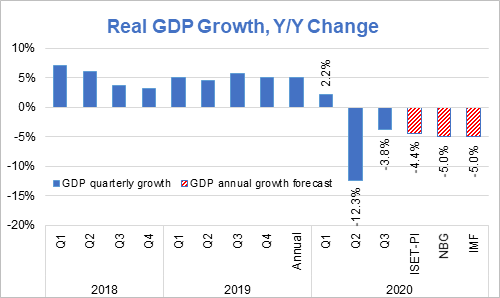- Details
According to the preliminary statistics released by GeoStat, Georgia’s real GDP contracted by 3.8% year over year (y/y) in Q3 2020. As a result, the estimated real GDP declined by 5.0% in the first nine months of 2020, which is in line with the International Monetary Fund’s (IMF) and National Bank of Georgia’s (NBG) latest projections of -5% y/y (from October and November correspondingly). Meanwhile, based on October’s data, ISET-PI expects lower GDP contraction in 2020, as the forecast stood at -4.4%.
In Q3 2020, the economy showed signs of revival after the lifting of COVID-19-related restrictions. Fiscal spending combined with improved credit activity and increased remittances helped domestic demand to rebound. At the same time, external demand remains weak mainly due to the unprecedented decline in international travel. Increased production costs caused by pandemic-related constraints and disruption in value chains were additional factors responsible for negative growth rates in the reported quarter.
- Details
The COVID-19 outbreak has negatively affected the Georgian economy through reduction in FDI, exports of goods and services, and remittances. In addition, uncertainties caused by the pandemic and containment measures hit consumption and domestic investment. As a result of this reduction in aggregate demand, combined with increased production costs due to pandemic-related constraints, GDP is expected to contract by 5% in 2020 according to NBG’s latest monetary report. The growth estimate has been revised downward since May, when NBG’s forecast stood at -4%. The revision was driven by weaker-than-previously-anticipated external demand, which is mainly caused by delays in the resumption of international flights. According to an alternative scenario, in which pandemic-related restrictions remain in place the whole year, a 6.5% decrease in GDP is expected in 2020.












